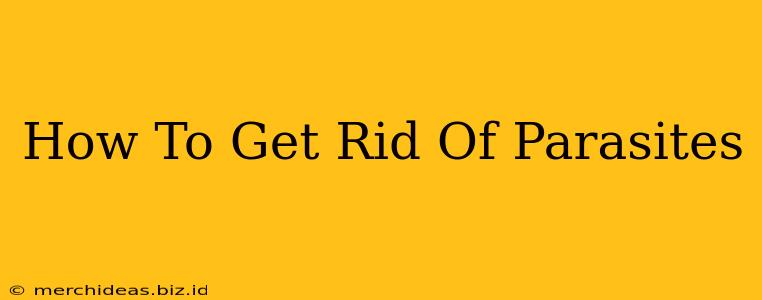Parasites. Just the word sends shivers down your spine. These unwelcome guests can wreak havoc on your health, causing a range of uncomfortable and sometimes serious symptoms. But don't despair! This comprehensive guide will explore effective ways to get rid of parasites and prevent future infestations. We'll cover everything from identifying potential infections to exploring natural remedies and medical treatments.
Understanding Parasite Infections
Before diving into treatment, it's crucial to understand the different types of parasites and how they infect the body. Common types include:
- Protozoa: Microscopic, single-celled organisms like Giardia and Cryptosporidium, often contracted through contaminated food or water.
- Helminths: Worms, including tapeworms, roundworms, and hookworms, which can be acquired through contaminated soil, undercooked meat, or contact with infected animals.
- Ectoparasites: Parasites that live on the body, such as lice, fleas, and ticks.
Symptoms of parasitic infection can vary widely depending on the type and location of the parasite. Common symptoms might include:
- Gastrointestinal issues: Diarrhea, nausea, vomiting, abdominal cramps, bloating.
- Skin problems: Rashes, itching, lesions.
- Fatigue and weakness: Feeling constantly tired and lacking energy.
- Weight loss: Unexplained weight loss despite maintaining your diet.
- Anemia: Low red blood cell count.
Identifying a Parasite Infection
Suspecting a parasitic infection? Seeing a doctor is crucial for accurate diagnosis. They may perform tests such as stool samples, blood tests, or imaging studies to identify the specific parasite and determine the best course of treatment. Self-treating can be dangerous, so always seek professional medical advice.
Treatment Options for Parasites
Treatment will depend on the type of parasite and the severity of the infection. Options may include:
Medications:
Your doctor might prescribe antiparasitic medications specifically designed to kill or eliminate the parasites. These medications are highly effective, but it's important to follow your doctor's instructions carefully and complete the full course of treatment, even if you start feeling better.
Natural Remedies:
While natural remedies can play a supportive role in some cases, they are not a substitute for medical treatment. Some commonly discussed options include:
- Herbal remedies: Certain herbs, like cloves and wormwood, have been traditionally used to combat parasites, but their effectiveness varies and more research is needed. Always consult a healthcare professional before using herbal remedies.
- Dietary changes: A healthy diet rich in fruits, vegetables, and whole grains can support overall health and may help to reduce the likelihood of parasitic infections.
- Improved Hygiene: Thorough handwashing, proper food preparation, and avoiding contact with infected animals are crucial preventative measures.
Preventing Parasite Infections
Preventing parasitic infections is often easier than treating them. Here are some key preventative measures:
- Practice good hygiene: Wash your hands thoroughly and frequently, especially after using the restroom, handling raw meat, and before eating.
- Cook food properly: Ensure meat and poultry are cooked to the appropriate internal temperature to kill any potential parasites.
- Wash fruits and vegetables: Thoroughly wash all produce before consumption to remove any contaminants.
- Drink clean water: Avoid drinking untreated water, especially when traveling to areas with poor sanitation.
- Protect yourself from insect bites: Use insect repellent and wear protective clothing when spending time outdoors.
- Maintain good sanitation: Ensure proper disposal of waste to prevent the spread of parasites.
Conclusion:
Getting rid of parasites requires a multi-faceted approach. Accurate diagnosis from a healthcare professional is paramount, followed by appropriate medical treatment. While natural remedies might play a supplemental role, they should not replace professional medical advice. By understanding the different types of parasites, their symptoms, and prevention strategies, you can significantly reduce your risk of infection and maintain your overall health. Remember, prevention is always better than cure! Consult your doctor if you suspect you may have a parasitic infection.
